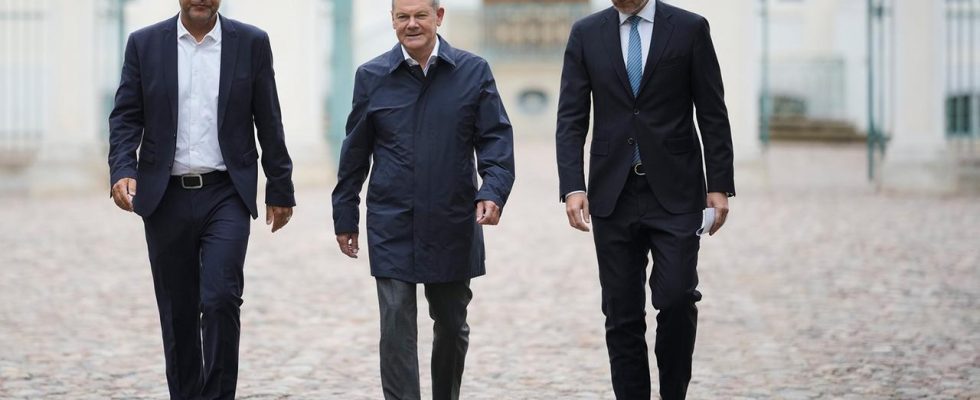The federal government has presented measures that are intended to relieve the economy of tax burdens to a greater extent than previously planned. But not all problems can be solved with money, emphasized Finance Minister Lindner daily topics.
In view of the economic downturn in Germany, the federal government wants to provide impetus for more economic growth. Chancellor Olaf Scholz said at the cabinet meeting in Meseberg that the federal government wanted to launch an “offensive” to stimulate growth. “We will also use tax measures to ensure that investments are made now and not postponed,” said Scholz at a joint appearance with Vice Chancellor Robert Habeck (Greens) and Finance Minister Christian Lindner (FDP).
Scholz, Habeck and Lindner presented a ten-point plan for Germany as a business location. It is about tax relief for companies, reducing bureaucracy, investing in climate protection, more skilled workers from abroad or faster planning and approval processes. Many projects are already on the way. According to the paper, the current economic slowdown should not result in long-term investments in the future being inhibited by companies or in housing construction continuing to decline.
Relief increased to seven billion euros
A key point is the planned Growth Opportunities Act, the annual relief volume of which is to be increased to 7.035 billion euros for the period up to 2028. The relief volume had previously been estimated at around 6.6 billion euros. The draft law is to be formally passed by the cabinet on Wednesday in Meseberg. The tax offsetting of losses will therefore be slightly expanded again. In the future, no longer 60 but 80 percent of the losses should be tax deductible within four years.
The temporary introduction of degressive depreciation for residential buildings was also newly included in the law. It is intended to apply to buildings whose construction begins after September 30, 2023 and before October 1, 2029. The law contains numerous other reliefs in the corporate sector, including an investment premium “to promote the transformation of the economy in the direction of more climate protection in particular”.
The cabinet decision on the Growth Opportunities Act was originally planned two weeks ago. At that time, Family Minister Lisa Paus (Greens) had lodged an objection because of the dispute with Finance Minister Lindner about the financing of basic child security.
“Turnaround Potential”
Habeck said the economic and political situation was quite challenging. “In any case, it is not such that one can say: economy makes economy and politics stays out.” Now the signals must be sent that it is worth investing in Germany.
Lindner explained: “We take seriously that Germany is growing less dynamically than others. But at the same time we also know about the substance of this country. We have a strong economic structure of medium-sized companies and industry. That is why there is also enormous potential for a turnaround in our country , which we want to support through various measures.”
Lindner: Not all problems can be solved with money
Business associations had asked the federal government to provide a relief package – against the background of high energy prices by international standards or too much bureaucracy. Some economists have now criticized that the latest package is not enough. In the daily topics said Lindner to make significantly more money available, but was not wise. “Debt-financed economic stimulus programs in the current situation would cause prices to rise.”
In addition, money is not the only solution, according to Lindner. “Sometimes our problems can’t be solved with money because the procedures are too lengthy and bureaucratic, and because we lack the skilled workers.” There are also still major deficits in the public infrastructure that cannot be solved overnight.
No agreement on the subject yet industrial electricity price
However, a dispute within the federal government about a state-subsidized lower industrial electricity price is still unresolved.
Germany’s economic output fell again at the beginning of the year and stagnated in the second quarter. High inflation continues to weigh on consumer sentiment. At the end of July, the International Monetary Fund lowered its expectations for economic development in Germany. Accordingly, the gross domestic product in this country will shrink by 0.3 percent this year.
After the recent disputes in the coalition, Scholz called on cabinet members to contribute to the government’s success with better communication. He wished for “good cooperation” for the government as a whole, said Scholz. In his view, the government has “a very successful track record”.

